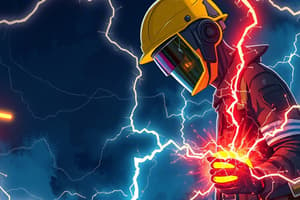Podcast
Questions and Answers
What is a scenario that exemplifies direct contact electric shock?
What is a scenario that exemplifies direct contact electric shock?
- Coming into contact with the heating element of an appliance that is powered (correct)
- Touching a live wire while wearing insulated gloves
- Standing in water while using an electrical device
- Using a non-electrical tool near a power source
Which of the following describes indirect contact electric shock?
Which of the following describes indirect contact electric shock?
- Holding a live wire while standing on an insulated platform
- Touching a faulty electrical appliance while standing on a dry surface
- Grasping an electrical tool that has no battery or power source
- Being shocked through a device not properly connected to ground (correct)
What is one of the potential dangers associated with electrical work?
What is one of the potential dangers associated with electrical work?
- Injury from lifting heavy electrical equipment
- Electric shock due to improper handling of live conductors (correct)
- Reduced work efficiency in low light conditions
- Exposure to hazardous materials unrelated to electricity
What federal safety standard is crucial for protecting against electrical hazards?
What federal safety standard is crucial for protecting against electrical hazards?
Why is good housekeeping important in electrical work environments?
Why is good housekeeping important in electrical work environments?
What is indirect contact in the context of electric shock?
What is indirect contact in the context of electric shock?
What causes a person to receive an electric shock from an appliance?
What causes a person to receive an electric shock from an appliance?
Which of the following factors increases the severity of an electric shock?
Which of the following factors increases the severity of an electric shock?
What level of shock current can be fatal?
What level of shock current can be fatal?
What happens to the metal casing of an appliance in fault conditions without earthing?
What happens to the metal casing of an appliance in fault conditions without earthing?
What is the role of a protective conductor in an electrical appliance?
What is the role of a protective conductor in an electrical appliance?
In which situation would a person most likely experience indirect contact?
In which situation would a person most likely experience indirect contact?
Which part of the electrical system is typically earthed?
Which part of the electrical system is typically earthed?
What can happen if there is an insulation failure in an appliance?
What can happen if there is an insulation failure in an appliance?
Which component is responsible for preventing electric shock through earthing?
Which component is responsible for preventing electric shock through earthing?
What is the primary factor that determines whether an electric shock is classified as direct contact?
What is the primary factor that determines whether an electric shock is classified as direct contact?
Which of the following statements best illustrates indirect contact electric shock?
Which of the following statements best illustrates indirect contact electric shock?
What is a significant danger when performing electrical work without proper precautions?
What is a significant danger when performing electrical work without proper precautions?
Which of the following is an essential measure for enhancing safety during electrical work?
Which of the following is an essential measure for enhancing safety during electrical work?
How does proper housekeeping contribute to electrical safety?
How does proper housekeeping contribute to electrical safety?
What occurs during indirect contact when a person touches a live appliance?
What occurs during indirect contact when a person touches a live appliance?
Which factor does NOT influence the severity of an electric shock?
Which factor does NOT influence the severity of an electric shock?
What is a common characteristic of a live metal casing of an appliance under fault conditions?
What is a common characteristic of a live metal casing of an appliance under fault conditions?
What type of electric current is considered potentially fatal?
What type of electric current is considered potentially fatal?
What is indicated if the metal casing of an appliance is not connected to a protective conductor?
What is indicated if the metal casing of an appliance is not connected to a protective conductor?
How does the duration of current flow affect injury severity from electric shock?
How does the duration of current flow affect injury severity from electric shock?
Which component is crucial in preventing electric shock through earthing?
Which component is crucial in preventing electric shock through earthing?
In the event of an insulation failure, what is the likely effect on the appliance?
In the event of an insulation failure, what is the likely effect on the appliance?
Which scenario exemplifies a person getting shocked through indirect contact?
Which scenario exemplifies a person getting shocked through indirect contact?
What consequence might occur if a person touches a live appliance with an ungrounded casing?
What consequence might occur if a person touches a live appliance with an ungrounded casing?
Flashcards are hidden until you start studying
Study Notes
Electric Shock Overview
- Electric shock occurs when electric current flows through the human body, potentially leading to injuries or fatalities.
- Two types of electric shock:
- Direct contact occurs when a person touches a live conductor.
- Indirect contact occurs when a person touches a conductive part that has become live due to a fault.
Types of Electric Shock
-
Direct Contact:
- Involves contact with a live conductor under normal conditions, such as touching the heating element of an appliance.
- The appliance's casing is earthed to protect against electric shock.
-
Indirect Contact:
- Occurs when a person touches exposed conductive parts that have become live due to insulation failure or faults.
- Example: A metal casing not connected to an earth wire becomes live, resulting in a shock when touched.
Severity of Electric Shock
- Severity depends on two main factors:
- Amount of current flowing through the body.
- Duration of current exposure.
- A shock current of 50 mA can be fatal.
Emergency Response to Electric Shock
- Switch off the power supply before assisting the victim.
- Avoid direct contact with the victim to prevent passing the current.
- Use a dry item or wooden object to separate the victim from the electric source.
- Do not move an injured person until checked for further injuries; place them in a recovery position if necessary.
Safe Work Practices
- Maintain a safe work environment to minimize risks associated with electricity.
- Key practices include:
- Proper tool maintenance and use.
- Inspection of tools before each use.
- Switching off power before starting electrical work.
Importance of Good Housekeeping
- Good housekeeping reduces the risk of accidents and fire.
- Benefits include improved productivity, better use of space, and showcasing a well-managed operation.
General Safety Rules in Electrical Work
- Use only insulated tools; electrical work should be performed by qualified personnel.
- Always switch off power and unplug devices before working on them.
- Regular inspection and maintenance of electrical equipment are essential.
- Disconnect broken appliances from the power supply and replace damaged cords.
- Use tools and test equipment correctly; read instructions thoroughly.
- Keep electrical cords off the floor to prevent damage or accidents.
Electric Shock Overview
- Electric shock occurs when electric current flows through the human body, potentially leading to injuries or fatalities.
- Two types of electric shock:
- Direct contact occurs when a person touches a live conductor.
- Indirect contact occurs when a person touches a conductive part that has become live due to a fault.
Types of Electric Shock
-
Direct Contact:
- Involves contact with a live conductor under normal conditions, such as touching the heating element of an appliance.
- The appliance's casing is earthed to protect against electric shock.
-
Indirect Contact:
- Occurs when a person touches exposed conductive parts that have become live due to insulation failure or faults.
- Example: A metal casing not connected to an earth wire becomes live, resulting in a shock when touched.
Severity of Electric Shock
- Severity depends on two main factors:
- Amount of current flowing through the body.
- Duration of current exposure.
- A shock current of 50 mA can be fatal.
Emergency Response to Electric Shock
- Switch off the power supply before assisting the victim.
- Avoid direct contact with the victim to prevent passing the current.
- Use a dry item or wooden object to separate the victim from the electric source.
- Do not move an injured person until checked for further injuries; place them in a recovery position if necessary.
Safe Work Practices
- Maintain a safe work environment to minimize risks associated with electricity.
- Key practices include:
- Proper tool maintenance and use.
- Inspection of tools before each use.
- Switching off power before starting electrical work.
Importance of Good Housekeeping
- Good housekeeping reduces the risk of accidents and fire.
- Benefits include improved productivity, better use of space, and showcasing a well-managed operation.
General Safety Rules in Electrical Work
- Use only insulated tools; electrical work should be performed by qualified personnel.
- Always switch off power and unplug devices before working on them.
- Regular inspection and maintenance of electrical equipment are essential.
- Disconnect broken appliances from the power supply and replace damaged cords.
- Use tools and test equipment correctly; read instructions thoroughly.
- Keep electrical cords off the floor to prevent damage or accidents.
Studying That Suits You
Use AI to generate personalized quizzes and flashcards to suit your learning preferences.




